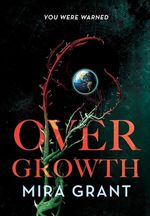Overgrowth
Mira Grant
★★★½☆
I did like this book, but not as much as I’d expected to.

The main character has been certain since childhood that she’s actually an alien plant who replaced a little girl lost in the woods. (More of a classic changeling than the October Daye type.) And because of the kind of book it is, she’s right.
The prologue is not for the squeamish. But the rest of the novel is more eerie sci-fi and less horror.
It’s mostly told from Stasia’s point of view, with occasional fragments of letters, or teacher’s notes, or scientific articles between chapters. One of the problems I had was that most of the other characters aren’t…well, maybe I shouldn’t say “fleshed out” when half of them are plant people, but while Stasia’s puzzlement over their motivations supports the story thematically, it makes it less engaging. Though there is an interesting shift in perspective as the advance vanguard becomes less human and more plant.
Doomed
I can’t help but think of this as a more cynical, post-COVID take on some of the same themes as Newsflesh. It’s got the same kind of small group of found family vs. vast forces bigger than themselves (including improbable escapes from secret government facilities), wrapped in a body horror tale in which humans are being replaced and/or eaten by something that looks almost but not quite human. But in this version, we’ve been too busy tearing each other down to band together and protect humanity. The author doesn’t state so outright, but her response on a Reddit AMA regarding how she would write it differently now echoed through my mind repeatedly while reading it.
I would not write the Newsflesh trilogy. Being able to write that series required me to have a measure of faith in both a public health response and in the desire of my fellow humans to keep the people around them safe, and I have lost that faith, essentially completely. I am no longer optimistic enough for Newsflesh.
And while the humans of Newsflesh are able to fight back the zombie hordes and rebuild civilization, it quickly becomes clear that the best anyone can do here is salvage what’s worth preserving of humanity.
More Connections
I ended up reading a cluster of oddly-related books this summer: Overgrowth reminded me to finally read Interference, another book with intelligent alien plants, mimicry, and invasions with shifting alliances. Interference and The Downloaded both involve long-lost interplanetary expeditions reconnecting with Earth. The Downloaded and When the Moon Hits Your Eye are both character studies in an apocalypse that can’t even be mitigated. Even Automatic Noodle opens with the main characters waking up long after a disaster (though it’s only months, and only a local disaster.)